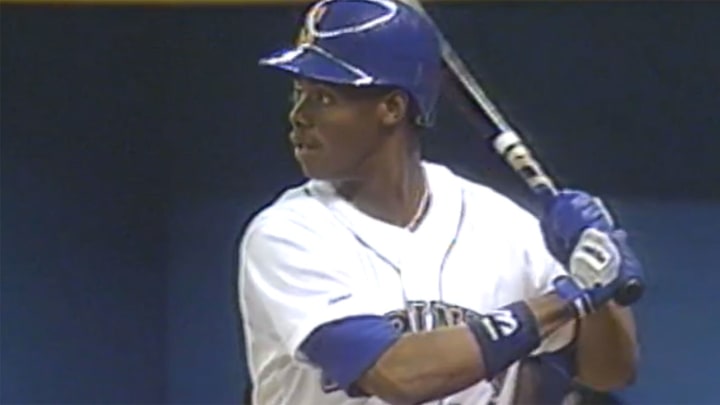Ken Griffey Jr. hit his first home run 28 years ago today, and we're all old now

Think back to your first baseball memory—a home run, a great play, a blooper. How long ago was it? A decade? More? Is it a number that makes you feel slightly weak, like you want to get back in bed for the rest of the day?
Twenty-eight years ago today, a young prodigy by the name of Ken Griffey Jr. stepped to the plate for the Mariners against White Sox righthander Eric King at the Kingdome. Griffey, then a mere 19 years old and about 18 months removed from being the No. 1 pick of the draft out of high school, had nonetheless made the team out of spring training; going into that April 10 game against Chicago, he had all of 21 major league plate appearances to his name and just two hits and a walk to show for it. But facing King with one out, nobody on and the Mariners down 1–0 in the first, Griffey took the first pitch he saw that day and poked it over the leftfield wall for the first home run of his big league career.
The attendance that night at the Kingdome was 33,866 fans—just barely half the stadium's capacity, which probably isn't that much of a surprise given that the 1988 Mariners had lost 93 games, had little expectations for '89, and were starting the serviceable yet forgettable Scott Bankhead against a White Sox team that would go on to lose 92 games itself. Even the promise of watching a phenom can't put that many people in the seats—and besides, how many of them can actually be so good so quickly as to turn a moribund franchise into a must-watch event?
I don't know how many of those 33,866 people were present to see the first home run of one of the greatest careers the game has ever seen; I don't even know how many of those 33,866 were actually there, and how many were the result of the time-honored practice of a team counting tickets sold but not actually fans through the gate. Either way, at least some of those people missed the homer entirely. Maybe they were late to the game because they were stuck in traffic or left the house or the office too late. Maybe they were waiting in line for a beer or a hot dog, trying to beat the rush for concessions but getting stuck in it. Maybe they stayed home sick, or canceled for a date, or just couldn't muster the energy to throw on a coat and grab the car keys or make the walk. Those who were there stood and cheered for the Kid's first ever home run, then sat down and talked excitedly with their friends or seat neighbors or quietly penciled a "HR" into the scorebook next to Griffey's name. Then they settled in for a 6–5 Mariners win, just the team's second in its first seven games. Griffey finished that day 1-for-3 with that mantelpiece home run and a walk; he hit 15 more homers that season as part of a .264/.329/.420 line that looks unimpressive until you remember that he wasn't yet old enough to drink or vote or rent a car.
For a number of fans, Griffey's home run was just one more entry in a long and increasingly fuzzy series of baseball memories equally encompassing the incredible and the mundane. But for a select few—specifically the children in the stands, still trying to make out just what the whole deal with this sport was—that sight of a skinny teenaged Griffey unfolding his picture-perfect swing and hitting a line drive over White Sox outfielder Ron Kittle and the 12-foot-high fence in left some 331 feet away from home plate is the first image they can call to mind when someone asks them about baseball. The details are likely lost or hazy—the journeyman likes of King and Kittle, the direction of the ball, the inning or score or count or even the day—but the home run there, floating about in the brain's ether next to this week's shopping list and the lyrics to Pearl Jam's "Jeremy." (I feel like it's a safe assumption that the memory banks for most Pacific Northwesterners are largely dedicated to grunge, specifically trying to remember the difference between Mudhoney and Green River.)
Not all of us are lucky enough to get a future Hall of Famer taking that initial step toward greatness as the first memory. My first baseball memory is one of the worst starts of Roger Clemens's career, a laugher against the Twins on July 23, 1995 in which he gave up eight runs in 1 1/3 innings while an eight-year-old me (probably) cried in the stands at Fenway Park. And yet all I remember of that game is watching Clemens walk off the mound; the details are totally lost to me (and so, honestly, was the date and opponent; it took some thorough searching through Baseball-Reference to dig it up).
That game was almost 22 years ago, and while I'm too vain to count myself among the ranks of the old, I can't help but feel like dust itself when I think about how long ago that was. So, too, for those who watched Griffey's first home run of 630 land in the first few rows of the Kingdome's leftfield bleachers, either in person or on TV. There was no way for them to re-watch it until the nightly news or the next morning's edition of "SportsCenter" showed it, if they even did. All they could do was play it in their heads, over and over again; now, 28 years later, they can, if they want, pull it up on the supercomputer they carry around at all times and watch it to their heart's content.
Griffey would reach heights of brilliance few ever had, then suffer through injuries, age and retire. The Kingdome, then in its 13th year of operation, would see 11 more years before it was closed, demolished and replaced. The video of Griffey's homer, once crystal clear, would degrade with time, and nowadays it looks like a relic of another age entirely. The fans went home that night and kept living their lives; they watched several hundred more Griffey home runs and got old with him. Today, when they watch the video of that homer, maybe they feel a little grayer, a little creakier, find themselves noticing wrinkles they never knew existed. But they get to relive and rebuild the memory, even as it makes them feel ancient.
